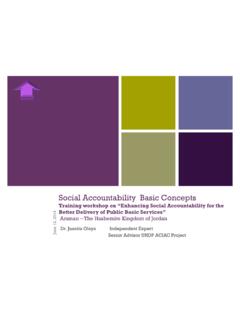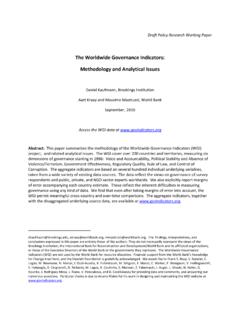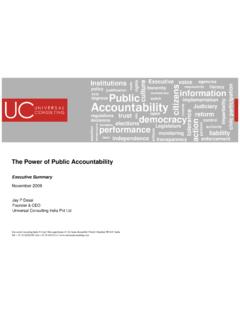Transcription of Local Policing accountability, leadership and ethics ...
1 1 Local Policing accountability , leadership and ethics Issues and Questions paper The Police Reform and Social Responsibility Act 2011 enabled the election of the first Police and Crime Commissioners (PCC)s in November 2012. Elected PCCs would, in the words of the then Police Minister Nick Herbert, swap the bureaucratic control of the police for democratic accountability which would benefit police and public alike. Section 14 of the Policing Protocol 2011 makes clear: The public accountability for the delivery and performance of the police service is placed into the hands of the PCC on behalf of their electorate. The PCC draws on their mandate to set and shape the strategic objectives of their force area in consultation with the Chief Constable. They are accountable to the electorate; the Chief Constable is accountable to their PCC.
2 The [Police and Crime] Panel within each force area is empowered to maintain a regular check and balance on the performance of the PCC in that context. The Policing Protocol also makes clear at section 10 that All parties will abide by the seven principles set out in Standards in Public Life: First Report of the Committee on Standards in Public Life (a) (known as the Nolan Principles ). The Seven Principles of Public Life are Selflessness, Integrity, Objectivity, accountability , Openness, Honesty and leadership . In January 2014 the National Audit Office published a review of the police accountability landscape, examining whether the Department s chosen framework is sufficient for providing assurance for value for money in the police service and operating as intended. Naturally, given the remit of the NAO, the focus of their report was on assurance for value for money.
3 It was not within their scope to consider the extent to which the accountability framework for Policing was sufficient for providing assurance that the Seven Principles of Public Life were being observed. The Committee on Standards in Public Life, which advises the Prime Minister on ethical standards across public life in the UK, is responsible for monitoring and reporting on issues relating to the standards of conduct of all public office holders. The category of public office holder includes members of the police service, Police and Crime Commissioners and members of Committee on Standards in Public Life Committee on Standards in Public Life 2 Police and Crime Panels. It is clearly within our remit to consider the accountability framework for Policing in the context of ethical standards.
4 In our report Standards Matters, published in January 2013, just months after the first PCC elections, we noted the risks arising from new ways of delivering public services, including Policing . We stated then that It is essential to take care in all these cases [where new models are introduced] to design governance structures which actively promote the right ethical behaviour and that We intend to monitor the extent to which PCCs are genuinely open and accountable and how successfully any ethical risks (such as conflicts of interest) arising from their role are addressed. We have decided that the time is right to undertake a review of how ethical standards are being addressed in the police accountability landscape. There are three reasons for doing this now. Firstly, as with any new system, it is sensible to review its operation to test how well it is living up to its original rationale and at this point we have the benefit of nearly two years of evidence on which to base any judgements.
5 Secondly, the new system as a whole, and individual elements of it, have been the subject of criticism, much of it arising from standards issues, yet the relationship between standards and governance structures has been relatively underexplored; more needs to done to consider how governance structures can promote ethical behaviour and limit ethical risks. And finally, in the light of recent scandals and criticisms, all political parties have indicated that they are likely to make further changes to the police accountability framework. We believe any changes should be informed by the widest possible range of evidence evidence on efficiency, on effectiveness, on value for money, on democratic accountability and on public confidence in standards in public life. This inquiry by the Committee on Standards in Public Life sits alongside the work already done by the National Audit Office, and is being conducted alongside a review of police leadership by the College of Policing , a review of the police disciplinary system by Major General Clive Chapman, a review of police complaints, a consultation on whistleblowing, and a review of the anti-corruption capability in all police forces by Her Majesty s Inspectorate of Constabulary.
6 A substantial evidence base on accountability in Policing is being constructed. Our contribution, in this inquiry, will be to focus on the public accountability structures of the police. The reviews announced by the Home Secretary in July 2014 focus on the systems that hold police officers to account; we will complement her work by looking at accountability in police governance from a standards point of view. In particular, we will look at what structures are in place for ensuring ethical standards in the conduct and operation of Police and Crime Panels, Police and Crime Commissioners, and Chief Constables. We will then go on to consider how effective those structures are, identify what works well and, where there are shortcomings, what we would expect to see in any model for police accountability .
7 We will be seeking the necessary assurance that ethical standards in public life are, and are capable of being, upheld. Whether a new model of Policing accountability and governance is introduced, or whether the existing model is modified or stays the same, it essential that the model is capable of promoting 3 ethical behaviour, reducing ethical risks and providing effective accountability in order to command public confidence. The Committee would like to receive your answers to some or all of the questions set out in this paper. Please send in your response by no later than noon on 30 November 2014. Details on how to submit your response can be found at the bottom of the call for evidence. Background 1. Our Policing system relies on Policing by consent in ways that meet the differing needs and priorities of communities.
8 Operational decisions are taken by Chief Constables, who are held to account through democratic scrutiny, which over time has taken various forms watch committees, police committees, two forms of police authorities and now Police and Crime Commissioners. The changing forms of oversight are evidence of the difficult and continuing tensions in achieving democratic scrutiny that commands public trust and confidence in operational Policing . 2. Police and Crime Commissioners (PCCs) replaced Police Authorities in 2012 as the voice of the public and as a means of improving the accountability and transparency of the police to their Local communities. As the Home Secretary recently said the purpose of directly-elected police and crime commissioners was clear. They d be elected, visible, well-known in their communities and accountable to the electorate.
9 1 When PCCs were elected across England and Wales on 15 November 2012 the average voter turnout was low at % and this has raised questions about the validity of the role and the extent of their electoral mandate. This debate has continued following the recent election of the PCC in the West Midlands where the voter turnout was Police and Crime Panels were also established as a means of ensuring that PCCs would be subject to effective scrutiny and appropriate checks and balances by Local representatives on behalf of the 3. The Government has pursued other significant reforms of Policing including establishing the College of Policing in 2012 to set standards of professional practice, promote ethics , values and standards of integrity and provide training and identify and promote best practice.
10 More recently the Home Secretary has announced reviews of the Police Disciplinary System and Police Complaints System and a consultation on This has been in the face of public concern in recent years over police standards including Hillsborough, Orgreave Colliery, the investigation of the murder of Stephen Lawrence and how police conducted themselves afterwards, the resignation of a Cabinet Minister as a result of the actions of at least one 1 Speech by Home Secretary Theresa May to Policy Exchange about Police and Crime Commissioners. Delivered on 7 November 2013. Available at: 2 Policing in the 21st Century: Reconnecting police and the people Cm 7925 July 2010 3 July 2014 Oral statement to Parliament. Available at: 4 dishonest police officer, the sexual deception of citizens who trusted undercover police officers, and others.



















